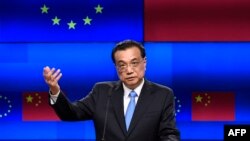Late Chinese Premier Li Keqiang Remembered for Repression
The late Chinese Premier Li Keqiang, who played a prominent role in the Chinese Communist Party during the past decade, is remembered by Uyghur and Tibetan communities for his leading role in the severe crackdown on Muslims in Xinjiang and Tibetans in Tibet. His legacy is associated with mass detentions, allegations of torture, forced sterilizations and forced labor, and is labeled as genocide by some nations, despite China's denials. Li's involvement in these repressive policies, revealed in the leaked Xinjiang Papers, challenges his image as a "man of the people" and has prompted demands for accountability and condemnation from experts and human rights advocates.
Chinese Diplomat in NY Denies Genocide, Draws Scrutiny for Meetings in US
The Chinese consul general in New York, Huang Ping, who has been embroiled in controversy because of his denial of Uyghur genocide, has conducted meetings in Pennsylvania with business leaders and Democratic state senators. These meetings, considered routine consular duties aimed at enhancing subnational cooperation between China and the U.S., have raised concerns given Huang's controversial stance. The U.S. has officially labeled China's treatment of Uyghurs as genocide, contributing to the debate surrounding these interactions.
Progress, Challenges in Combating Uyghur Forced Labor in Supply Chains
Since its implementation in June 2022, the Uyghur Forced Labor Prevention Act has made strides in restricting U.S. imports linked to forced labor, particularly from China's Xinjiang region. U.S. Customs and Border Protection has detained nearly $2 billion worth of goods, with a focus on the fashion industry, as Xinjiang produces 90% of China's cotton. Companies have had to invest in mapping their supply chains to comply with the law. However, challenges persist, and experts believe that addressing the economic drivers of forced labor requires a global effort and cooperation with international stakeholders and major consumer markets.
China Announces Free Trade Zone in Xinjiang Despite Human Rights Concerns
Beijing has announced plans to establish a free-trade zone in the Xinjiang region, as part of President Xi Jinping's Belt and Road Initiative. This move raises concerns because of alleged human rights abuses against the Uyghur population in Xinjiang. The plan seeks to grant Xinjiang officials more autonomy to attract foreign investors from Belt and Road Initiative member countries. Despite previous sanctions for human rights violations, the Xinjiang Production and Construction Corps will be involved in creating the free-trade zone, which aims to promote the use of the Chinese yuan in international trade.
Fiji Withdraws Support from UN Motion on Xinjiang Rights Violations
Fiji has withdrawn its support from the Joint Statement on Human Rights violations in Xinjiang, a motion supported by 51 nations at the United Nations. The statement called for an end to abuses in Xinjiang, citing potential international crimes against humanity. Fiji's move is perceived as an effort to protect its diplomatic ties with China. Its initial support was seen as unusual for a Pacific country and surprised many observers, as such nations often align with China.
Chinese Officials' Gaza-Xinjiang Comparison Sparks Controversy
Chinese Embassy officials in France have caused controversy by posting a social media comparison between Gaza and Xinjiang, contrasting intact buildings in Xinjiang with those damaged in Gaza. This highlights concerns about human rights abuses in Xinjiang, where the Chinese government is accused of arbitrary detentions and rights violations against Uyghur Muslims. China's role in the Israeli-Palestinian conflict and its strategy in the Middle East are also in focus, with some Chinese officials drawing parallels between Gaza and Xinjiang to suggest Beijing's policies have brought prosperity to Uyghurs while criticizing Western and Israeli actions in Gaza.
International Uyghur Forum Calls on Japan to Investigate Xinjiang Abuses
At the International Uyghur Forum in Tokyo, parliamentarians from various countries issued a joint declaration urging Japan to conduct an independent investigation into China's alleged human rights abuses against Uyghurs in Xinjiang. The declaration also called for sanctions against involved Communist Party officials. The forum aimed to document the Uyghur genocide, raise awareness in Asia and discuss legal strategies.
In a recent revelation, Hikvision, a leading Chinese technology company, was found to include ethnic minority detection technology in its latest software, despite previous claims of discontinuation. Internet Protocol Video Market exposed this inclusion, sparking human rights concerns about Hikvision's history of providing tools for targeting ethnic minorities. Hikvision responded to Voice of America, attributing the issue to an employee's error and stating its long-standing policy against such technology.
Quote of note
"There's no way you can compare this. There's no tiny street in East Turkistan [Xinjiang's name before the 1949 Chinese invasion] where you can even speak or throw a rock."
— Rahima Mahmut, U.K. director for the World Uyghur Congress, to Newsweek




